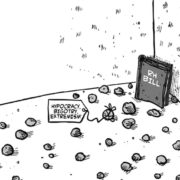ACCORDING to Drs. Tyler Cowen and John Nye (professors at George Mason University in Washington DC), under the leadership of President Benigno Aquino III, the Philippines has “the best chance of becoming a tiger economy in Asia.”
The visiting foreign economists said that the country is “on the verge of an economic takeoff,” reports Inquirer.net.
Cowen and Nye were in the Philippines as speakers for the inaugural conference at the Angara Center for Law and Economics (a think tank that “will undertake economic research and innovative public policy solutions” and established by Sen. Edgardo Angara).
Cowen said that the “Philippines has strong economic fundamentals,” with the 2-year-old Aquino administration’s economic gains, English proficiency and belief in education as “key ingredients for economic liberation.”
Nye cited “hot money flowing into the Philippines” and the rapid transformation of the telecommunications industry in the country as significant factors.
Meanwhile, Ruchir Sharma, in his book, Breakout Nations: In Pursuit of the Next Economic Miracles, also said: “At long last the Philippines is on the road to becoming part of the elite group of ‘tiger economies’ primarily due to the leadership of its new president Benigno ‘Noynoy’ Aquino III.”
Ruchir Sharma is chief of the Emerging Markets Equity team at Morgan Stanley Investment Management.
“The new president, Benigno ‘Noynoy’ Aquino III, probably has enough support, and looks likely to generate just enough reform momentum, to get the job done. The Aquino name is still virtually synonymous with the promise of change,” Sharma further wrote.
“Aquino is delegating power to competent technocrats and seems to understand what needs to be done to get the lights back on.” But Sharma believes that in order for the Philippines to win back its old glory, it needs to see “a modicum of political stability and some basic economic sense.”
The Philippines’ vast resources: oil, copper, nickel, gold and silver — if managed properly, can bring the economic surge that the country needs.
Sharma views the Philippines’ booming population as a “big economic plus,” saying that “the concentration of people and business drives growth.”
He also cites English proficiency as an advantage — bringing BPO’s to Philippines shores, a $9-billion industry that has generated jobs for 350,000 Filipinos.
Sen. Angara called on his kababayans to “seize the moment,” mentioning that key reforms in the economy as human capital, health, education, science and technology, research, renewable energy and infrastructure, are areas that requires support in order for the country to achieve “sustainable growth” that would benefit even the poor.
He emphasized infrastructure development as the catalyst for a “momentum of change.”
“Unless you provide mobility to labor, then you get stuck in Samar or Leyte, and they’ll do anything to get to Metro Manila and create those slums. Infrastructure is key. How many airports do we have that are unflyable because there are no connecting roads?” he said.
Angara envisions that his think thank will make immense contributions “toward making growth sustainable.”
“This is a small, initial step toward trying to open the Filipino mind to the outside world. As all the speakers have said, we try to create new ideas, new insights so that we can join the global conversation,” he said, adding that the country has good researchers but “no organized research on strategic areas — research that will support lawmaking and administrative and executive policymaking.”
Wide-range issues as global investment, human capital, corruption, international arbitration and enforcement, dispute settlements, and public policy issues in international trade and investment were discussed during the conference.
According to Nye, long-range changes can be achieved if the country will focus on two areas: simplifying the rules and opening up the market further.
“The most important change is the mindset of protection and nationalism. There are good reasons to protect the Philippine economy, but there are also bad reasons,” he said, adding that “the most important change is the mindset of protection and nationalism. There are good reasons to protect the Philippine economy, but there are also bad reasons.”
Nye believes that “loosening up laws” would “attract more investments, more development, more decentralization so we can hire more of those workers here in the Philippines.”
While the Aquino administration may be beset with socio-political criticisms and low popularity ratings, it is comforting to know that things are looking up in the economic front.
Perhaps, all we need is to keep an open mind.
(LA Midweek August 8-10, 2012 Sec A pg.A8)
(www.asianjournal.com)






